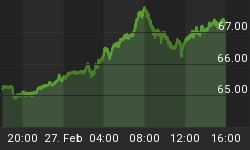Looking for group think, extrapolation of extreme silliness, linear thinking, and belief in absurd models?
Then look no further than Fed presidents, their advisors, and academia loaded charlatan professors.
Today's spotlight is on Marvin Goodfriend, a former economist and policy advisor at the Federal Reserve's Bank of Richmond, and Ken Rogoff, a chaired Harvard economics professor, a one-time chief economist at the International Monetary Fund.
Case for Minus 2% Rates
Goodfriend says the Fed Might Need to Cut Rates to Minus 2 Percent.
The U.S. Federal Reserve might need to cut interest rates to as low as negative 2 percent, far lower than levels other global central banks have tested, a former Fed economist said.
That's what would likely be needed to engineer a recovery if the U.S. economy were to fall into a recession in the next couple of years, Marvin Goodfriend, who was an economist and policy advisor at the Federal Reserve's Bank of Richmond from 1993-2005, told CNBC's "Squawk Box" on Thursday.
Goodfriend, who is currently a professor of economics at Carnegie Mellon University, pointed to data on the eight recessions in the U.S. since 1960.
"In eight of those recessions, the Fed had to push the short rate 2.5 percentage points below the long term rate. Today, the 10-year rate in the U.S. is 1.5 percent," he noted, saying that would indicate that during the next recession, the Fed would need to cut rates as low as minus 1 percent at a minimum.
"In five of those recessions, the Fed had to push the federal funds rate 3.5 percentage points below the 10-year bond rate," he said. "So if that happens this time around, we would have to push the federal funds rate to minus 2 percent."
Linear Thinking Idiocy
Goodfriend extrapolates what the Fed did in the past with what the Fed might need to do in the future. Not once did this mentally-challenge wizard stop to ask:
- Did the Fed really "need" to do what it did before?
- Did excessively low rates create any bubbles?
- Why do we need a Fed in the first place?
- Who does the Fed serve?
- Can the economy be managed like a cook following a recipe to bake a cake?
- Isn't the fact that the Fed "needed" to do this eight times indicative of a major problem in and of itself?
James Grant Blasts Ken Rogoff in Wall Street Journal Op-Ed
Please consider Hostage to a Bull Market by James Grant.
If there is a curse between the covers of this thin, self-satisfied volume, it doesn't have to do with cash, the title to the contrary notwithstanding. Freedom is rather the subject of the author's malediction. He's not against it in principle, only in practice.
Ken Rogoff is a chaired Harvard economics professor, a one-time chief economist at the International Monetary Fund and (to boot) a chess grandmaster. He laid out his case against cash in a Saturday essay in this newspaper two weeks ago. By abolishing large-denomination bills, he said there, the government could strike a blow against sin and perfect the Federal Reserve's control of interest rates.
In a deep recession, Mr. Rogoff proposes, the Fed ought not to stop cutting rates when it comes to zero. It should plunge right ahead, to minus 1%, minus 2%, minus 3% and so forth. At one negative rate or another, the theory goes, despoiled bank depositors will stop saving and start spending. According to the worldview of the people who constitute what Mr. Rogoff fraternally calls the "policy community" (who elected them?), the spending will buttress "aggregate demand," thus restore prosperity.
This is a big can of worms that the author has pried open. He assumes, first and foremost, that falling prices are a calamity. It is not such a calamity that many Americans don't spend most of the weekend seeking them out. Still, the policy community wants nothing to do with them.
And the policy community, especially in Europe, has had its way. More than $13 trillion of sovereign debt (German, Japanese, Swiss) is quoted at a yield of less than nothing. In Denmark, the banks pay homeowners to take out a mortgage. In Switzerland, depositors pay the bank to accept their francs.
Negative rates? You rub your eyes and search your memory. You can recall no precedent. And if you consult the latest edition of "A History of Interest Rates" (2005) by Sidney Homer and Richard Sylla, you will find none. A recent check with Mr. Sylla confirms the impression. Today's negative bond yields, he says, are the first in at least 5,000 years.
As for the campaign for zero cash in the service of negative interest rates, Mr. Rogoff's brief is best seen not as detached scientific analysis but as a kind of left-wing crotchet. Strip away the technical pretense and what you have is politics. The author wants the government to control your money. It's as simple as that.
A Simple as This
Grant says it's as simple as politics. Rogoff wants the government to control your money.
Clearly Rogoff wants government to have control of your money. But it's not as simple as that. These guys are economic lunatics who actually believe negative interest rates will help the economy.

Negative Interest Rate Theory


A currency crisis awaits.















